
Simply click on a question and you will be taken to the answer.
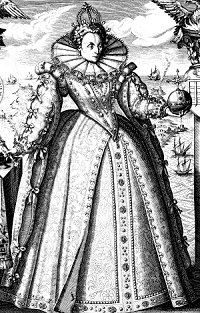 General
Questions
General
Questions
Who were the
Tudors?
When did they rule
England?
Why are they so
famous?
What did they
accomplish?
Can you give me a
brief history of Tudor England?
Where can I view
the Tudor family tree?
Where can I look
at portraits of the Tudors?
What is the 'Tudor Rose'?
Does this
website have a search engine?
I am quoting
from this website for my paper / report. How do I correctly cite
the source?
When
was the site last updated?
Specific Questions
Was Henry VII really a miser?
Did Elizabeth of York really hate Henry VII?
Did Prince Arthur and Katharine of Aragon consummate their marriage?
Why did Henry VIII
have six wives?
Who were the six
wives?
Did Henry VIII
really murder all his wives?
What was the
'King's Great Matter'?
What was the
Reformation?
How did Henry
VIII die?
How did
Katharine of Aragon die?
Why do you
spell Katharine's name as you do? (And why do you spell
Catherine Howard and Katharine Parr's differently?)
Was Anne
Boleyn really a witch? Did she have an extra finger? Did
she really commit adultery and have an incestuous affair with her
brother? How many times was she pregnant as Queen?
Where is Anne
Boleyn buried?
Did Jane Seymour die of complications from a Caesarean section?
Was Anne of
Cleves really that ugly?
What happened
to Anne of Cleves after Henry divorced her?
Did Catherine
Howard commit adultery while Queen of England?
Where is
Catherine Howard buried?
How many
times was Katharine Parr married?
Was
Katharine Parr imprisoned by Henry VIII?
What happened to Henry VIII's sisters, Margaret and Mary Tudor?
Did Henry VIII execute a lot of people?
Did Henry VIII have a legitimate reason to divorce Katharine of Aragon?
Who is the 'Nine
Days Queen'?
Did Lady
Jane Grey want to be Queen of England?
Did Lady
Jane Grey love her husband?
Where is
Lady Jane Grey buried?
Why is Mary I
called 'Bloody Mary'?
Are there two
Mary Tudors at this site?
Did Mary I
really hate her half-sister, Elizabeth?
Was Mary I
ever pregnant during her marriage to Philip of Spain?
What were
Mary I's last words?
Where is
Mary I buried?
Was
Elizabeth I truly a great queen - or did her ministers do all the work?
How smart
was Elizabeth I?
Did
Elizabeth ever plan to marry anyone?
Was
Elizabeth really a 'Virgin Queen'? Did she have secret lovers
and/or children?
Why is the
1588 battle with the Spanish Armada so famous?
Why are there
so many portraits of Elizabeth I?
Where is
Elizabeth I buried?
Why was
Mary, queen of Scots a prisoner in England?
How long
was Mary, queen of Scots a prisoner in England?
Are Mary,
queen of Scots and Mary Tudor the same person?
Why did
Elizabeth I have Mary, queen of Scots killed?
Was Mary,
queen of Scots guilty of the crimes for which she was executed?
Where is
Mary, queen of Scots buried?
Why
is Mary, queen of Scots's last name sometimes spelled 'Stewart' and
other times 'Stuart'?
Why did
Elizabeth I leave her throne to James I of Scotland?
What
dynasty followed the Tudors?
Who were the
Tudors?
The Tudors were a Welsh-English
family that ruled England from 1485 to 1603. Henry Tudor was the
son of Margaret Beaufort, who was descended from King Edward III
through an illegitimate line, and Edmund Tudor, the son of Princess
Catherine of Valois and her second husband, Owen Tudor. Through
Catherine of Valois, Jasper was the half-brother of the last
Lancastrian king, Henry VI. The Yorkist branch of the Plantagenet
dynasty would eventually seize the throne from the incompetent Henry
VI, but their reign ended when Richard III was killed at the battle of
Bosworth Field on 22 August 1485. Henry Tudor then claimed the
throne as King Henry VII. He promptly married Elizabeth of York,
daughter of the only successful Yorkist king, Edward IV, and niece of
Richard III.
Henry VII and Elizabeth of York's
second son, three of their grandchildren and one of their
great-grandchildren, would rule England as part of the Tudor
dynasty. When their rule ended, the throne passed to the Scottish
branch of their family - James I was the great-grandson of their
daughter, Margaret Tudor.
Visit Tudor Genealogy
for more information.
TOP
When did
they rule England?
The Tudors ruled England from 1485
to 1603.
TOP
Why are
they so famous?
The Tudors are famous because their
dynasty was full of colorful characters and big events. Henry
VIII and his six wives.... the English reformation.... the tragic tale
of Lady Jane Grey.... the great intelligence of Elizabeth I and the
artistic accomplishments of her reign.... During the sixteenth
century, England emerged from the medieval world. It was a time
of great change, most notably it marked the end of the Catholic church
in England. There was an attendant rise in nationalism, a new
spirit of confidence and patriotism swept the country. Great
naval exploits began the great English seafaring tradition.
Whether as pirates or officers or explorers, Elizabethan sailors
controlled the seas. And besides the political and religious
changes, the Tudors themselves were interesting and complex people.
TOP
What did
they accomplish?
The Tudors were able to establish
England as a world power. They did so by positioning their
country as a peace-maker between the dueling powers of France and
Spain/the Holy Roman Empire. They also gave England a century of
dynastic stability. With the exception of Lady Jane Grey's brief
reign and Catholic attempts to place Mary, queen of Scots on Elizabeth
I's throne, most Tudor monarchs came to the throne - and remained on
the throne - unchallenged. This lengthy period of peace allowed
England a much-needed respite from the Lancastrian-Yorkist wars.
Government ran more efficiently; royal power replaced that of
aristocrats and there was a uniform system of justice and taxation
throughout the country. And, as always in times of peace, the
arts flourished.
TOP
Can you
give me a brief history of Tudor England?
Tudor England began when Henry VII
became king in 1485. There were five Tudor monarchs, not counting
Lady Jane Grey who ruled for just nine days. The monarchs were,
in order, Henry VII (ruled from 1485 to 1509), his son Henry VIII
(ruled from 1509 to 1547), Edward VI, son of Henry VIII (ruled from
1547 to 1553), Mary I, daughter of Henry VIII (ruled from 1553 to
1558), and Elizabeth I, daughter of Henry VIII (ruled from 1558 to
1603.) The most powerful Tudor monarchs were Henry VIII and
Elizabeth I, though she was far more beloved of the English
people. Both were powerful personalities who were able to control
their squabbling councilors and answer the demands of an increasingly
vocal Parliament. Under Henry VII, the English government came to
be more stabilized and centralized. Under Henry VIII, English
authority was tested on the Continent, though even military victories
were too costly to maintain. A great victory over Scotland early
in his reign (1513) was most notable; the attendant confusion of its
northern neighbor was beneficial for England. Henry VIII's
desperate quest for a legitimate heir led to the
Reformation; this was the end of the Catholic church's authority in
England. The king, unable to obtain an annulment, declared
himself Supreme Head of a new English church. He also sold or
destroyed most church property in England. His son, Edward VI,
was just a child when he inherited the throne but already known for his
piety and serious nature. His councilors continued to strengthen
the Protestant state, but their plans were dashed when Edward died at
16 years of age. An attempt to place his Protestant cousin, Lady
Jane Grey, on the throne instead of the Catholic Princess Mary
failed. Mary was declared queen to great acclaim; she was
originally very popular even with the Protestants. But a policy
of religious persecution, a hated marriage with Philip of Spain, and
bad agricultural conditions (as well as the debt she had inherited from
her father and brother) soon made Mary broken-hearted and
disliked. She was succeeded by her half-sister, Elizabeth, who
was a religious pragmatist and passionately devoted to her
country. Elizabeth's policy of toleration was extended to both
the religious and political spheres. Above all else, she avoided
extremism at all costs. She often prevaricated over major
decisions, unwilling to commit to an action before all diplomatic
attempts failed. This infuriated many of her advisors, but it
also gave her country the religious and political peace it needed to
thrive. Her reign was marked by the great victory over the
Spanish Armada in 1588, the artistic achievements of men such as
Shakespeare and Bacon, and English exploration and colonization of
North America.
TOP
Where can I view the
Tudor family tree?
Visit the Tudor Genealogy
site. It has a graphic image of the family tree and a more
detailed text genealogy.
TOP
Where can I
look at portraits of the Tudors?
You can visit the Images section of my
site. You can also visit Tudorhistory.org
and Tudor-portraits.com.
TOP
What
is the 'Tudor Rose'?
The Tudor
Rose is the most famous symbol of the Tudor dynasty. You can see
a beautiful example of it on the main page.
It shows the petals of a red rose enfolding the petals of a white
rose. The red rose was the symbol of the House of Lancaster and
the white rose was the symbol of the House of York. Henry VII was
the first Tudor king and a Lancastrian. He married Princess
Elizabeth of York. Their marriage was the literal union of both
houses, symbolized by the new 'Tudor Rose'. Also, the Wars of the
Roses were thus called because they represented the 15th century
struggle between Lancaster and York for the throne of England.
TOP
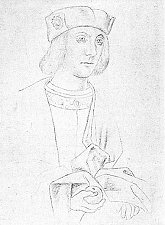
sketch of the
future King Henry VII while he was exiled in France
Was Henry
VII really a miser?
Henry VII, the first Tudor king, was
tight-fisted with money. His tax inspectors were notorious and
despised. However, the English treasury was nearly empty after
years of wars. Henry was determined to create a stable government
and all governments need money to run. It became something of an
obsession with him, particularly in his later years. But to his
credit, he left a healthy treasury to his son and heir, Henry VIII -
which the latter promptly spent.
To learn more about Henry VII, visit his
website.
TOP
Did
Elizabeth of York really hate Henry VII?
Many authors have argued that
Elizabeth hated Henry because he took the throne from her family and
she was forced to marry him. But all the contemporary accounts I
have read indicate they had a pleasant enough marriage. Henry VII
never had an affair and he genuinely mourned her death in 1503.
Elizabeth's life as queen was primarily domestic. Her motto
'Humble and Reverent' sums up her character.
TOP
Did Prince
Arthur and Katharine of Aragon consummate their marriage?
This question was very important
during Henry VIII's reign. He said his marriage to Katharine
should be annulled because she had been his brother's wife. He
disregarded the papal dispensation which had given them permission to
wed in 1509 by arguing that the Pope could not disregard the Bible
itself. There are passages in Leviticus which specifically forbid
a man taking his brother's wife as his own. Katharine swore that
she and Arthur had never consummated their marriage, as did her duenna.
I have to support Katharine of
Aragon on this one; her marriage to Arthur probably wasn't
consummated. They were both young and Arthur was already very
ill. Also, Katharine was deeply pious; it is difficult to believe
she would lie to a papal legate about such a thing.
TOP
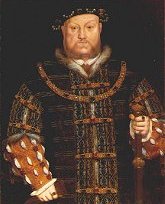
portrait of King
Henry VIII, c1542
Why did
Henry VIII have six wives?
Henry had six wives because....
He had the first wife because he was
betrothed to her by his father. He had the second wife because he
fell in love and also needed a legitimate male heir. He had the
third wife because he still needed a male heir. He had the fourth
wife because of diplomatic reasons. He had the fifth wife because
he fell in love again. He had the sixth wife because he was old
and sick and grouchy and needed a companion and nurse who wouldn't give
him too much trouble.
To learn
more about Henry VIII's six wives, visit their website.
TOP
Who were
the six wives?
They were (in order) Katharine of
Aragon, Anne Boleyn, Jane Seymour, Anne of Cleves, Catherine Howard and
Katharine Parr.
TOP
Did Henry
VIII really murder all his wives?
No, only two of the six wives were
executed - the second wife, Anne Boleyn, and the fifth wife, Catherine
Howard. His first wife died of natural causes. His third
wife died from childbirth complications. His fourth wife was
divorced and outlived him. And the sixth wife outlived him as
well.
TOP
What
was the 'King's Great Matter'?
This refers to Henry VIII's attempts
to annul his marriage Katharine of Aragon and marry Anne Boleyn.
It consumed several years of his reign.
It also involved the dissolution of all Catholic
monasteries in England.
TOP
What
was the Reformation?
The Reformation refers to a period
in the early 16th century in which the Roman Catholic Church was
challenged by a new form of Christianity collectively known as
Protestantism. The Catholic Church was both a religious and
political institution; by the 16th century, corruption was widespread
and many Christians were disappointed in the excesses and abuses of
church leaders.
The Reformation began in 1517 when a
German priest named Martin Luther posted his Ninety-five Theses on the
door of a royal church in Wittenberg. Luther did not want to
start a new religion; he merely wanted to reform the papacy.
However, a few years later, Pope Leo X excommunicated him.
Luther's main philosophical idea was 'justification by faith', the idea
that salvation is granted as a gift through God's grace and not through
a priestly intermediary. He also advocated marriage for the
clergy. His ideas were revolutionary and scandalous, but also
very popular. They represented an attempt to bring religious
faith back to the people and end long-standing corruption within the
church. But the doctrine of 'justification by faith' also sharply
curtailed the church's power over spirituality, making it a matter of
personal debate and belief. As Lady Jane Grey, the Nine Days'
Queen of England, wrote of her Protestant faith in 1554, 'I ground my
faith upon God's word, and not upon the church.... The faith of
the church must be tried by God's word, and not God's word by the
church; neither yet my faith.'
In England, the Reformation was
mainly associated with Henry VIII's attempts to annul his marriage to
Katharine of Aragon. When the papacy refused to annul their union
due to the political pressure of Katharine's nephew, Holy Roman Emperor
Charles V, Henry was outraged. He spent several years attempting
to persuade the pope to change his mind. In the end, he simply
declared himself Supreme Head of the Church of England and confiscated
all church lands and money in his country. This is known to
history as 'the dissolution of the monasteries.' However, Henry
VIII remained a spiritual Catholic; he disliked Luther's ideas and was
never a Protestant himself. He simply rejected Roman Catholic
influence in England. But he had unwittingly opened up the door
to dramatic changes. From 1533 onwards, the influence of the
Roman Catholic Church in England declined while the new ideas of the
Reformation began to slowly gain adherents. The resulting
religious convulsions would consume most of Europe for the entire
century. In Tudor England, the conflict between the old faith and
the new consumed its rulers. Henry VIII was a lapsed Catholic;
his successor Edward VI was a devout Protestant; his successor Mary I
was a devout Catholic; her successor Elizabeth I was, understandably
enough, a religious pragmatist. However, she came into conflict
with her Catholic cousin, Mary, queen of Scots.
TOP
How did
Henry VIII die?
Henry had been in ill health for
some time. He was obese and this led to many complications in his
health, such as fevers, headaches and ulcers. He died on 28
January 1547 after suffering through a bad fever; he was bled during
his illness, which undoubtedly contributed to his death.
To learn
more about Henry VIII's life, visit his website.
TOP
How did
Katharine of Aragon die?
Contrary to rumor, Katharine was not
poisoned by Henry VIII. If he had been that ruthless, he would
have killed her years before and saved himself the whole trouble of his
'Great Matter'. Most historians believe she died of cancer.
To learn more about Katharine of Aragon, visit her
website.
TOP
Why do you spell
Katharine's name as you do? (And why do you spell Catherine
Howard and Katharine Parr's differently?)
I spell Katharine of Aragon's name as it is spelled on her tomb at
Peterborough. I chose to spell Catherine Howard's with a 'C'
because it's spelled thus by LB Smith in his biography of Henry VIII's
fifth queen. Katharine Parr's name is spelled that way to differentiate
her from the wife who preceded her.
TOP
Was
Anne Boleyn really a witch? Did she have an extra finger?
Did she really commit adultery and have an incestuous affair with her
brother? How many times was she pregnant as Queen?
No, Anne Boleyn was not a
witch. Yes, she did have a small growth on one hand which some
have called an extra finger. No, she did not commit adultery or
have an incestuous affair with her brother. Even her enemies
admitted the charges were false, simply used as excuses to execute
her. She was pregnant at least three times, but only gave birth
to one living child - a baby girl who would grow up to be Elizabeth I.
To learn more about Anne Boleyn, visit her
website.
TOP
Where is
Anne Boleyn buried?
Anne Boleyn is buried at the chapel
of St Peter ad Vincula at the Tower of London. She is not buried
in a regular coffin, however, since one was not provided; instead, her
body was forced into an old arrow chest.
TOP
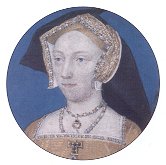
miniature portrait
of Jane Seymour by Lucas Horenbout
Did Jane
Seymour die of complications from a Caesarean section?
This rumor has been around for a
long time, but it's not true. Jane actually lived several days
after the birth of her son, Edward, and was able to greet
well-wishers. But she soon succumbed to a violent fever and
died. Most historians believe she died from puerperal sepsis, an
infection which killed many new mothers. Keep in mind that, even
today, childbirth is a dangerous and bloody business. In the 16th
century, standards of hygiene were very lax. Puerperal sepsis
caused severe fevers and delusions; it was almost always fatal.
Henry VIII's sixth wife, Katharine
Parr, would also die from it.
To learn more about Jane Seymour, visit her
website.
TOP
Was
Anne of Cleves really that ugly?
It's ironic to me that, of all of
Henry's six wives, the one who is most attractive to modern eyes is the
one he divorced for being a 'Flanders mare'. You can look at portraits of
Anne (one is below this answer) and decide for yourself. It
was probably a simple case of 'chemistry', or a lack thereof. You
want to kiss some people and you don't want to kiss others - why?
Henry VIII simply wasn't attracted to her but that doesn't mean she was
ugly; it simply means she wasn't his type.
To learn more about Anne of Cleves, visit her
website.
TOP
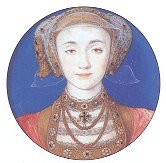
miniature portrait of Anne of Cleves by Hans Holbein
What happened to Anne of
Cleves after Henry divorced her?
Anne remained in England, where she
was treated with great respect and honor. Henry called her his
'sister' and she was given lots of money and lands in their divorce
settlement. She came to court regularly and enjoyed the life of
an independent, wealthy woman. She also became quite fond of
English beer. I think we can agree that she was probably the
happiest of the six wives.
TOP
Did
Catherine Howard commit adultery while Queen of England?
Probably. You can read her
letter to Thomas Culpeper here.
To learn more about Catherine Howard, visit her
website.
TOP
Where is
Catherine Howard buried?
She is buried at the chapel of St
Peter ad Vincula, along with her cousin Anne Boleyn and other victims
of Henry VIII.
TOP
How
many times was Katharine Parr married?
Katharine was married four
times. Henry VIII was her third husband. She had one child
with her fourth husband, and died of puerperal sepsis shortly
afterwards.
To learn more about Katharine Parr, visit her
website.
TOP
Was
Katharine Parr imprisoned by Henry VIII?
Almost, but her quick wit and
instinct for survival saved her. Religious conservatives at
Henry's court attempted to persuade the king his wife was a
heretic. After being lectured one too many times on religious
matters by Katharine, Henry was inclined to agree. Katharine was
warned of the plot and, without letting on to the king, told him she
was grateful to talk about such matters with him so he could guide her
in the correct direction. His ego soothed, the king again favored
her. When guards came to arrest Katharine, Henry personally
berated them and protected her.
TOP
What
happened to Henry VIII's sisters, Margaret and Mary Tudor?
Margaret married the king of
Scotland, James IV, and upon his death, she married the earl of
Angus. Mary wed the king of France and, upon his death, she wed
the duke of Suffolk.
To learn more about Mary Tudor, visit her
website. To learn more about Margaret Tudor, visit
her website.
TOP
Did
Henry VIII execute a lot of people?
He executed a lot of people on
trumped-up charges, or what is commonly termed 'judicial murder'.
He was very capricious and tyrannical, particularly as he grew
older. He was also sensitive to other claims on the Tudor throne;
for that reason, he imprisoned or executed most of his Plantagenet
relatives.
TOP
Did
Henry VIII have a legitimate reason to divorce Katharine of Aragon?
Yes. Other queens were
divorced for a lot less. The annulment would have been granted if
Katharine's nephew had not been Holy Roman Emperor. His position
gave him great influence over papal policy.
TOP
How
did Edward VI die?
Edward died of tuberculosis.
Recently, historians and doctors suggested that it may have been
complicated by measles.
To learn more about Edward VI, visit his
website.
TOP
Who is the
'Nine Days Queen'?
The description refers to Lady Jane
Grey, the Tudor cousin who ruled England for just nine days in
1553. She was later executed by Mary I.
To learn more about Lady Jane Grey, visit
her website.
TOP
Did
Lady Jane Grey want to be Queen of England?
No, she did not.
TOP
Did
Lady Jane Grey love her husband?
No, quite the contrary. By all
accounts, she disliked Guildford and refused to have him crowned king,
though she appreciated his newfound maturity and composure upon their
imprisonment.
TOP
Where is Lady Jane Grey buried?
At the chapel of St Peter ad
Vincula, alongside Anne Boleyn and Catherine Howard. As at Anne's
execution, there was no coffin provided for Jane's corpse. Her
body lay beside the block for several hours before someone finally
found a coffin.
TOP
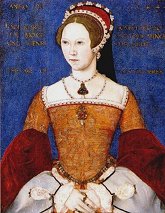
portrait of Princess Mary Tudor in 1544, by Master John
Why is
Mary I called 'Bloody Mary'?
Several hundred Protestants were
burned as heretics during her reign. Hence, she is called 'Bloody
Mary'.
To learn more about Mary I, visit her
website.
TOP
Are
there two Mary Tudors at this site?
Yes, one is Mary Tudor, sister of
Henry VIII. The other is Mary Tudor, daughter of Henry VIII.
TOP
Did
Mary I really hate her half-sister, Elizabeth?
Yes.
TOP
Was
Mary I ever pregnant during her marriage to Philip of Spain?
No. She thought she was pregnant - she hoped she
was - but it was probably an 'hysterical pregnancy'. Her
menstrual cycle was always irregular and she had a distended stomach,
possibly from a tumor.
TOP
What
were Mary's last words?
It is rumored she said that if her
body was cut open, the words 'Calais' and 'Philip' would be found
engraved upon her heart. It is an apocryphal story. Calais
was the last English outpost on the continent, lost during her reign,
and Philip was the beloved husband who had abandoned her.
TOP
Where
is Mary I buried?
In Westminster Abbey, beside her
half-sister, Elizabeth I.
TOP
Was
Elizabeth I truly a great queen - or did her ministers do all the work?
She was truly a great queen.
Though she had good ministers, chief among them William Cecil,
Elizabeth - like her father - was always in charge.
To learn more about Elizabeth I, visit her
website.
TOP
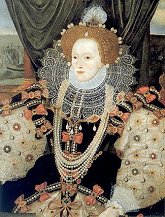
The Armada Portrait
of Queen Elizabeth I, by George Gower
How
smart was Elizabeth I?
Very smart. She was
undoubtedly one of the most (if not the most) intelligent monarchs to
rule England. She was always a dedicated scholar and genuinely
loved to study and learn. Her tutor Roger Ascham, and indeed
everyone who met her, recognized and commented upon her
intelligence. Of course, this was believed to be a 'masculine'
trait and only acceptable because of her special position as queen.
TOP
Did
Elizabeth ever plan to marry anyone?
Probably not. She used
marriage negotiations as political tools, and she personally loved
Robert Dudley. But she was never enthusiastic about the prospect
of marriage. And who can blame her? After the disastrous
examples of her father and half-sister, Elizabeth had no reason to
equate marriage with personal happiness. She also realized that
any marriage would end her authority as queen in her own right.
TOP
Was
Elizabeth really a 'Virgin Queen'? Did she have secret lovers
and/or children?
She was probably a virgin.
It's difficult to imagine any secret affair remaining secret for
long. And birth control was tricky and untrustworthy in the 16th
century. She knew that any affair would risk a pregnancy - and
that would destroy her life. Furthermore, it is worth noting
Elizabeth's own strict and methodical character, and the disdain she
showed for women who could not control their feelings or appreciate the
consequences of their actions. Consider her opinions of her two
cousins, Mary, queen of Scots and Catherine Grey. Both rushed
into hasty, inappropriate and passionate unions and both had disastrous
results. Elizabeth looked down upon them both, remarking that
they would do well to remember their high positions in life and its
attendant responsibilities.
She lamented her lost opportunities
for love and a family of her own. But she was queen and it was an
exalted and lonely position.
No, she never had children.
It's fun to read theories that she was the mother of Bacon - or
Shakespeare - or was even Shakespeare himself.... but could she really
keep a pregnancy secret? Foreign ambassadors paid her servants to
learn every intimate detail of her life. Upon hearing some gossip
about her relationship with Dudley, Elizabeth observed that a thousand
eyes were always upon her so how could she do anything scandalous?
TOP
Why
is the 1588 battle with the Spanish Armada so famous?
Because England was a small nation
with a little navy and they were facing the greatest power in the
world. And they defeated it, with help from Mother Nature.
It marked the beginning of England's mastery of the seas. The
great history of the English navy began, as did serious English
exploration and colonization.
TOP
Why are
there so many portraits of Elizabeth I?
Because she ruled for such a long
time (45 years) and because she understood the value of
propaganda. Her portraits were iconographic; they represented the
queen in all her majesty, triumphant and beautiful. They
symbolized the confidence and pride of her nation. It was also a
sign of loyalty to have portraits of the queen in your house.
Many nobles commissioned portraits, or copies of official portraits.
To view portraits of Elizabeth I, with
commentary, visit
the Elizabethan Images webpage.
TOP
Where
is Elizabeth I buried?
In Westminster Abbey, beside her
half-sister Mary I.
TOP
Why
was Mary, queen of Scots a prisoner in England?
Mary fled to England after losing a
battle against her Scottish foes. She was seeking Elizabeth's aid
in restoring her to the throne of Scotland.
To learn more about Mary, queen of Scots, visit her
website.
TOP
How
long was Mary, queen of Scots a prisoner in England?
Mary was imprisoned from 1568 to
1587. She was just 25 years old when she arrived in England and
44 years old when she was executed.
TOP
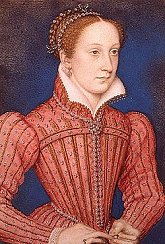
portrait of Mary,
queen of Scots, c1558
Are
Mary, queen of Scots and Mary Tudor the same person?
No. Mary Tudor was Henry
VIII's sister. Mary, queen of Scots was the granddaughter of
Margaret Tudor, Henry VIII's sister.
TOP
Why
did Elizabeth I have Mary, queen of Scots killed?
Because she was conniving to have
Elizabeth assassinated and herself made queen of England. In
fairness to Mary, she only began plotting after being imprisoned for
several years and it was clear she would never be released.
TOP
Was
Mary, queen of Scots guilty of the crimes for which she was executed?
Yes, probably. She even
admitted to plotting against Elizabeth, but said it was only to gain
her freedom.
TOP
Where
is Mary, queen of Scots buried?
In Westminster Abbey. Her body
was moved there by her son, James, who became king of England in 1603.
TOP
Why is Mary, queen of Scots's last name
sometimes spelled 'Stewart' and other times 'Stuart'?
In Scotland, her family name was
spelled 'Stewart'. However, Mary was half-French and spent her
formative years in France. Therefore, she adopted the French
spelling of Stewart, which was 'Stuart'. (She also signed her
name 'Marie', which was the French spelling of her first name.)
TOP
Why
did Elizabeth I leave her throne to James I of Scotland?
James was Elizabeth's closest male
relative. He was part Tudor as well, being the great-grandson of
Margaret Tudor, eldest daughter of the first Tudor king, Henry VII.
TOP
What
dynasty followed the Tudors?
The Stuart dynasty followed the
Tudors, so called because their family name was Stuart/Stewart.
TOP
Does
this website have a search engine?
Yes, it does. Click here to
visit the Tudor England search engine.
TOP
I am
quoting from this website for my paper / report. How do I
correctly cite the source?
The correct format is based upon
both the Turabian/Chicago and MLA styles.
Here is an example:
Hanson, Marilee. "Contemporary
Descriptions of Anne Boleyn." EnglishHistory.net. 2004.
http://englishhistory.net/tudor/annedesc.html (11 April 2004).
Please note: you must use
the year and date you read the source.
TOP
When
was the site last updated?
Please visit the Site
News page for the last update. I don't post routine
maintenance there, only significant additions to the website.
TOP